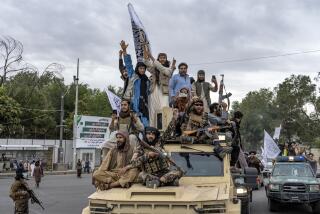Pakistan creates more distance between itself, Taliban
- Share via
QUETTA, Pakistan — As the Taliban’s power erodes in Afghanistan, officials in Pakistan are further distancing themselves from what remains of the embattled, hard-line regime.
One of only three countries ever to recognize the Taliban government, Pakistan on Monday said it has stopped doing business with its neighbors to the west. It also ordered the closure of yet another Taliban consulate, this one in the northwest city of Peshawar. Earlier this month, Pakistan ordered the Taliban to close its consulate in Karachi.
“We don’t conduct business between the government of Pakistan and whatever is left of the Taliban government,” Foreign Minister Abdul Sattar said during a news conference.
“But relations between Pakistan and Afghanistan continue and they will be maintained according to our best intentions,” he said.
Stopping “business” with the Taliban means not providing assistance or support and ending all communication, Pakistani government officials said.
With the closure of the Taliban consulate in Peshawar, that leaves the Islamabad embassy and a consulate in the southwestern city of Quetta as the regime’s only diplomatic offices.
The Taliban’s consulate in Karachi was ordered shut down a few weeks ago as a punitive measure against vocal Taliban ambassador Abdul Salam Zaeef. His news briefings until then were filled with claims of civilian casualties from U.S.-led air strikes and the deaths of U.S. soldiers.
After increased concern in Washington, Pakistan’s government ordered an end to the news conferences at the Afghan Embassy, in essence muffling the Taliban. The government cited a “third country” rule of international diplomacy, which forbids diplomats from defaming another country.
On Monday, Sattar cited the fact that the United Nations does not currently recognize any government in Afghanistan after a recent Security Council resolution that called for helping Afghans to form a transitional administration on the path to a broad-based, multi-ethnic government.
Pervaiz Iqbal Cheema, president of the Islamabad Policy Research Institute think tank, said Pakistan’s alliance with the U.S.-led coalition against terrorism played a part in Pakistan’s decision. He said Pakistan also has been trying to distance itself from the Taliban for more than a year since the regime refused to hand over murder suspects hiding behind its borders and did nothing to shut down smuggling routes.
“They are probably fed up with them,” he said. “They’ve been doing so much to support them, but Afghanistan has not been listening to Pakistan for some time.”
Retired Lt. Gen. Hamid Gul, once head of the Pakistani intelligence service, said Pakistan is sending mixed signals.
While Islamabad has called for “moderate” Taliban members to be included in a new broad-based Afghan government, Pakistan at the same time appears to be rejecting everyone belonging to the regime, he said.
“It’s the wrong time and the wrong language is being used,” Gul said. “They have not been de-recognized yet. There is no other government ready to replace them. It’s in Pakistan’s best interest to want moderate Taliban to have a share in a future government. A vast majority of Pakistanis and Pashtuns in the Northwest Frontier and Balochistan province are sympathetic to them.”
The United Arab Emirates also has severed diplomatic relations with the Taliban for harboring accused Saudi-born terrorist Osama bin Laden.
Islamabad on Monday urged the UN to ensure fair treatment of Pakistanis captured in fighting in Afghanistan. As Northern Alliance forces have captured cities in the north, some Pakistani fighters have been killed by Afghans angry about the armed foreign presence in their country. Numerous Pakistanis crossed the border to fight in support of the Taliban, following the start of the U.S.-led bombing campaign last month.
More to Read
Sign up for Essential California
The most important California stories and recommendations in your inbox every morning.
You may occasionally receive promotional content from the Los Angeles Times.













